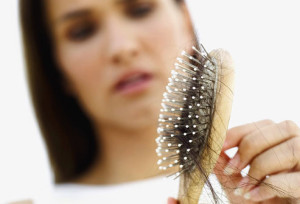|
It can start with a few extra strands in your hair brush and then before you realize it, thinning patches begin to occur. Many patients describe their hair loss as happening gradually and then suddenly. According to the American Academy of Dermatology, more and more men and women are suffering from hair loss than before. They estimate that at any given time 30 million women and men in the USA are affected by some form of hair loss during their lifetime.
Luckily, Chinese medicine has a long history of treating hair loss in both men and women. According to the principles of TCM, the growth and development of hair depends on proper functioning of qi and blood that is governed by the Kidney and Liver organ-meridian systems. The Liver organ-meridian governs hair health and is supported energetically by its connection with the Kidney, which influences the growth of all body cells, including hair. The Liver blood nourishes the hair follicle and the hair itself is seen as an extension of blood. The most common causes of declining hair condition, such as premature graying and hair loss, are deficient and/or stagnant Liver blood and Kidney qi deficiency. One example of this is postpartum hair loss. Many women experience hair loss in the several months after childbirth. According to Chinese medicine, this can be due to blood loss and/or the taxation of the Kidneys (the Kidney system can be likened to our reserve tank of the body) with childbirth and the postpartum months. Acupuncture can improve the flow of qi and blood in the scalp and can help hair to regrow and Chinese herbs can nourish qi and blood to stop more hair from falling out. From a Western medicine perspective, poor hair condition or hair loss can be attributed to a variety of causes, including hormonal imbalances (such as androgenic alopecia and hypothyroidism), autoimmune disorders, side effects of medication, and/or nutritional deficiencies. At San Francisco Integrative Medicine, we use both acupuncture and herbs together along with nutritional suggestions and lifestyle changes to help our patients who are suffering from hair loss. These combined therapies not only help in preventing further hair loss from occurring but also support future regrowth. Tips for Hair Loss
14 Comments
A Natural and Effective Way to Treat the Physical and Emotional Symptoms Associated with PMS5/15/2015 If you’re like most women on earth, no matter the severity of your symptoms, you probably have a complicated relationship with PMS. After all, what’s to like about premenstrual syndrome (PMS), with its ugly calling cards like mood swings, insomnia, bloating, and food cravings?
All told, the condition of PMS describes a collection of more than 150 physical and emotional symptoms that can strike the week before your period starts, lasting anywhere from a couple days to almost two weeks. Most Common Symptoms Associated with PMS
While there is not one primary cause of PMS, the hormonal fluctuations that occur during the menstrual cycle are considered the most likely contributors. Each month a variety of hormones cascade through the Hypothalamus-Pituitary-Ovarian Axis. These hormones dictate the timing and occurrence of several key events of your menstrual cycle including the growth and shedding of the endometrium and the growth and release of your egg at ovulation. After ovulation, during dramatic a shift in hormone levels, is usually when symptoms of PMS occur. Compounding the hormonal changes going on in your body, such factors as daily stress, lack of exercise, insufficient sleep, and unhealthy eating also play a role. When to Seek Treatment So when is treatment for PMS necessary? Most western medical professionals will dictate that treatment is not necessary for most women dealing with PMS, especially those with low grade symptoms. Regardless of the severity of your symptoms, if your PMS troubles you each month and impacts your quality of life, I would say treatment is always warranted. How Acupuncture and Chinese Medicine Can Help Luckily for women dealing with PMS and other problems associated with their menstrual cycle, gynecology is one of the main clinical specialties in Traditional Chinese Medicine (TCM). On top of looking at your medical and health history, your TCM practitioner will analyze the flow of energy, or qi, and blood in each patient as a means of identifying imbalances that are causing your symptoms. Therefore, treatments will address problems in a holistic manner and will able to reach the root of the problem. Research of Premenstrual Syndrome (PMS) has been shown to be successfully treated using acupuncture and Chinese herbs in numerous double-blind controlled studies. One study published in the Archives of Gynecology and Obstetrics found that 78% of women undergoing acupuncture treatments experienced less PMS symptoms within 24 hours after receiving the treatment. Though there isn’t conclusive evidence for how exactly acupuncture works according to Western medicine, it’s believed that it increases circulation and elevates endorphins levels, which enhance mood, relaxation and alleviate pain. Most people feel relief from pain and other PMS symptoms in the first 24 hours after an acupuncture treatment, so getting acupuncture treatments a day or two before your symptoms start is a great a place to begin. In order to fully address any hormonal irregularities causing your PMS symptoms, a TCM treatment should be continued routinely for at least three months. By Elanita Korian, L.Ac., MS |
Archives
December 2023
Categories
All
|
Proudly powered by Weebly



 RSS Feed
RSS Feed